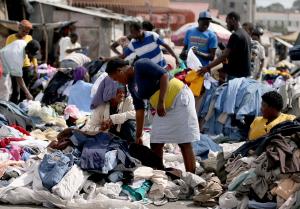News Information
- NEWS_POSTED_BY: Haiti Place
- NEWS_POSTED_ON: Jan 12, 2015
- Views : 793
- Category : General News
-
Description :
People shop for clothes in an open market as a day before the five year anniversary of a magnitude 7.0 earthquake hitting just before 5 p.m. on Jan. 12, 2010, destroying buildings and killing as many as 316,000 people on January 11, 2015 in Port-au-Prince, Haiti.
Joe Raedle—Getty Images
- Location : New York, NY, United States
- Website : http://time.com/3663806/haiti-earthquake-anniversary-future/
Overview
By Alex Fischer and Marc A. Levy
Alex Fischer and Marc A. Levy have been supporting initiatives in Haiti since 2008 and were in Port-au-Prince during the 2010 Earthquake.
The goal for this still fragile country to become an emerging economy by 2030.
Within three months of the 2010 earthquake in Haiti, the initial shock and sadness of the tragedy had been replaced by an enormous ambition: Haiti would build back better. Sadly, on the occasion of the fifth anniversary of the earthquake, the political crisis embroiling the country threatens what progress has been made.
Yet there have been remarkable innovations and some progress. These need to be kept alive so that once the current political crisis passes, development can resume. Among the most encouraging innovations to follow the Haiti disaster has been the ability to map, assess, and monitor investment and progress in an open data framework. This must continue.
